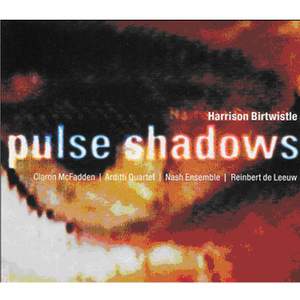Birtwistle: Pulse Shadows
Claron McFadden (soprano)
Arditti Quartet, Nash Ensemble, Reinbert de Leeuw
From Schoenberg's Pierrot lunaire to Boulez's Le marteau sans maître and Kurtág's Messages of the late RV Troussova, modernist composers have used the medium of voice with mixed instrumental... — More…
-
Gramophone MagazineMarch 2002Editor's Choice
Downloads
What are FLAC and MP3?Contents
Birtwistle: Pulse Shadows : I Fantasia 1
Work length3:03
$1.30
$1.70
- Arditti Quartet (string quartet), Claron McFadden (soprano)
- The Nash Ensemble
- Reinbert de Leeuw
Birtwistle: Pulse Shadows
Work length1:00:24
$22.10
$28.90
- Arditti Quartet (string quartet), Claron McFadden (soprano)
- The Nash Ensemble
- Reinbert de Leeuw
II Thread suns
Track length2:53
$1.30
$1.70
III Frieze 1
Track length3:36
$1.30
$1.70
IV White and Light
Track length6:12
$1.30
$1.70







